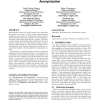Free Online Productivity Tools
i2Speak
i2Symbol
i2OCR
iTex2Img
iWeb2Print
iWeb2Shot
i2Type
iPdf2Split
iPdf2Merge
i2Bopomofo
i2Arabic
i2Style
i2Image
i2PDF
iLatex2Rtf
Sci2ools
125
click to vote
CCS
2010
ACM
2010
ACM
Towards publishing recommendation data with predictive anonymization
Recommender systems are used to predict user preferences for products or services. In order to seek better prediction techniques, data owners of recommender systems such as Netflix sometimes make their customers' reviews available to the public, which raises serious privacy concerns. With only a small amount of knowledge about individuals and their ratings to some items in a recommender system, an adversary may easily identify the users and breach their privacy. Unfortunately, most of the existing privacy models (e.g., kanonymity) cannot be directly applied to recommender systems. In this paper, we study the problem of privacy-preserving publishing of recommendation datasets. We represent recommendation data as a bipartite graph, and identify several attacks that can re-identify users and determine their item ratings. To deal with these attacks, we first give formal privacy definitions for recommendation data, and then develop a robust and efficient anonymization algorithm, Predi...
Related Content
| Added | 02 Sep 2010 |
| Updated | 02 Sep 2010 |
| Type | Conference |
| Year | 2010 |
| Where | CCS |
| Authors | Chih-Cheng Chang, Brian Thompson, Hui (Wendy) Wang, Danfeng Yao |
Comments (0)

